

Erica Webb
Parental Notification/Consent for Treatment of the Adolescent. American College of Pediatricians – May 2013 ABSTRACT: A continuing debate exists in both law and medicine regarding an adolescent’s capacity to make rational, independent decisions.
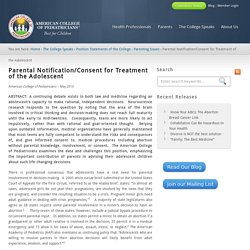
Neuroscience research responds to the question by noting that the area of the brain involved in critical thinking and decision-making does not reach full maturity until the early to mid-twenties. Consequently, teens are more likely to act impulsively, rather than with rational and goal-oriented thought. Relying upon outdated information, medical organizations have generally maintained that most teens are fully competent to understand the risks and consequences of, and give informed consent to, medical procedures including abortion without parental knowledge, involvement, or consent. The American College of Pediatricians examines the data and challenges this position, emphasizing the important contribution of parents in advising their adolescent children about such life-changing decisions.
Dr. The U.S. 1. 2. Association of Reproductive Health Professionals. Robert D.
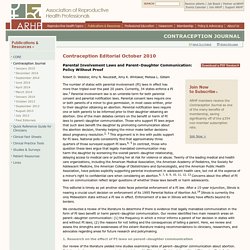
Webster, Amy N. Neustadt, Amy K. Whitaker, Melissa L. Gilliam The number of states with parental involvement (PI) laws in effect has more than tripled over the past 20 years. This editorial is timely as yet another state faces potential enforcement of a PI law. We conducted a review of the literature to determine if there is evidence that legally mandated communication in the form of PI laws benefit or harm parent–daughter communication. 1. Our review of the literature yielded nine studies examining rates of parent–daughter communication about abortion. Seven other studies examined rates of parent–daughter communication about the minor's pregnancy and her intention to terminate her pregnancy but only included samples of minors from states without PI laws in effect.17, 18, 19, 20, 21, 22, 23 Across these seven studies, 34–91% of minors told parents about their pregnancy termination plan. Minors and the Right to Consent to Health Care.
The Guttmacher Report on Public Policy August 2000, Volume 3, Number 4 Special Analysis The notion that many minors have the capacity and, indeed, the right to make important decisions about health care has been well established in federal and state policy.
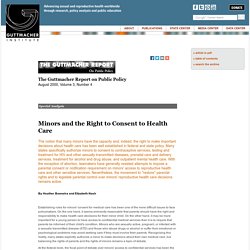
Many states specifically authorize minors to consent to contraceptive services, testing and treatment for HIV and other sexually transmitted diseases, prenatal care and delivery services, treatment for alcohol and drug abuse, and outpatient mental health care. Parental Consent and Notification Laws for Teen Abortions: Pro and Con. "While the intent of such laws is to enhance family communication, the failure to guarantee confidentiality often deters young people from seeking timely services and care resulting in increased instances of sexually transmitted diseases, unwanted pregnancies, and late term abortions.
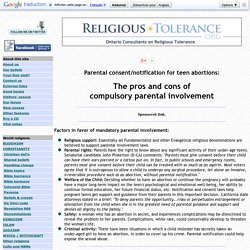
" 9 An ACLU briefing paper states: "...such laws are unnecessary for stable and supportive families, and they are ineffective and cruel for unstable, troubled families. Such laws cannot transform abusive families into supportive ones, nor can they reduce the alarmingly high rate of teenage pregnancy. Mini debate: abortion policy. Abortion policy: Should Minors Be Required to Receive Parental Consent Prior to Receiving an Abortion?

Yes: Ginger Sulton Abortion as a general topic is one that most will say is a pretty touchy issue. Those. What Are Teen Abortion Laws in the United States. Currently, abortions are legal in the United States of America.
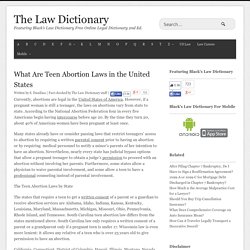
However, if a pregnant woman is still a teenager, the laws on abortions vary from state to state. According to the National Abortion Federation four in every five Americans begin having intercourse before age 20. By the time they turn 20, about 40% of American women have been pregnant at least once. Many states already have or consider passing laws that restrict teenagers’ access to abortion by requiring a written parental consent prior to having an abortion or by requiring medical personnel to notify a minor’s parents of her intention to have an abortion. Nevertheless, nearly every state has judicial bypass options that allow a pregnant teenager to obtain a judge’s permission to proceed with an abortion without involving her parents. Parental Involvement Laws in Minor Abortions. Parental Involvement Laws in Minor Abortions by Carrie Gordon Earll Laws requiring a parent’s notification or consent before his or her minor daughter can have an abortion are on the books in more than 40 states.

The following talking points provide arguments in support of these laws. Quotes About Recycling (19 quotes) Why Do People Choose to Recycle? Why do people recycle?

The primary reason is that they care about the environment; however, there are a few other reasons. Some people recycle because they believe in leaving as small a footprint on the environment as possible. Recycling is a positive step in making less of an impression of your existence and more of a lasting effect on reducing and reusing products. People who recycle typically take a conserving approach to most things in their lives andrecognize that individuals can make a difference by sending less refuse to the local landfill.
Recycling is also an economical way to save money. Recycling Statistics: Facts About Waste Looking at recycling statistics can be helpful to understand the reasons why recycling is so important. Stark State College - North Canton, Ohio. Recycling Quotes. Evidence. The Earth's climate has changed throughout history.

Just in the last 650,000 years there have been seven cycles of glacial advance and retreat, with the abrupt end of the last ice age about 7,000 years ago marking the beginning of the modern climate era — and of human civilization. Most of these climate changes are attributed to very small variations in Earth’s orbit that change the amount of solar energy our planet receives.
Scientific evidence for warming of the climate system is unequivocal. The current warming trend is of particular significance because most of it is very likely human-induced and proceeding at a rate that is unprecedented in the past 1,300 years.1 Earth-orbiting satellites and other technological advances have enabled scientists to see the big picture, collecting many different types of information about our planet and its climate on a global scale. The evidence for rapid climate change is compelling: Sea level rise Global temperature rise Warming oceans. Climate Change: Vital Signs of the Planet. National Geographic. First Mammal Species Goes Extinct Due to Climate Change The humble Bramble Cay melomys has disappeared from its island in the Great Barrier Reef.

Climate Change Making Calendars Run Amok People in Central Asia are recalibrating their system of time to adapt to a changing ecosystem. The Great Energy Challenge The National Geographic initiative is a call to action to become actively involved, to learn more and do more—to change how we think about and consume energy so that we can all help tackle the big energy questions. U.S.'s First Official Climate Refugees Race Against Time A Native American tribe struggles to hold on to their culture while their land slips into the Gulf of Mexico. Crocodiles and Palm Trees in the Arctic? The Arctic Is Melting. Climate Change. I Want to be Recycled. Where and How to Recycle. Reduce, Reuse, Recycle.